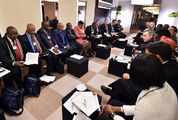SA’s fractious labour relations are headed for further turbulence this year, as weak economic fundamentals and a tough trading environment prompt workers into striking a hard bargain during wage negotiations.
Among those taking to the bargaining chamber this year will be the motor industry, whose three-year wage agreement comes to an end. Attention will also fall on platinum and gold producers, who will be looking to sign new multiyear agreements.
With inflation on the rise and economic growth on the decline, trade unions will be demanding above-inflation wage increases for their members at a time when employers do not have the means to pay them. The result could be accelerated job-shedding — already a reality in the mining industry, which is feeling the effects of the slump in commodity prices.
Added to the mix will be inter-union rivalry over turf, local government elections and opposition to provident fund reforms.
The year got off to a bumpy start, with the Congress of South African Trade Unions (Cosatu) taking on the law on the compulsory annuitisation of part of provident fund savings on retirement.
Adcorp CEO Richard Pike said on Friday the year was likely to be turbulent as the considerable rise in the cost of living comes when employers would find it difficult to meet workers’ demands for higher wages. "I do think we are in for a rough ride. It is quite a scary scenario. There are a lot of headwinds for employers at the moment."
If workers did win the wage battle, it would only contribute to the number of jobless. "Our research has shown that if wages go up by above inflation — which historically they have — then the consequence is that jobs are shed because it is unaffordable," Mr Pike said.
Another trend was the proliferation of nonaligned trade unions such as the Association of Mineworkers and Construction Union, posing a threat to the established trade unions. The result would be a high level of fragmentation of the union movement in the private sector, with Cosatu-affiliated unions continuing to dominate in the public sector.
The turf wars between the National Union of Metalworkers of SA and Cosatu could intensify during the local government elections as they could each throw their weight behind different political parties. Trade unions could extend their battle to new frontiers as they did by joining university students in their #FeesMustFall campaign.
Labour expert Andrew Levy’s advice is to "tighten your seatbelts as there will be a lot of workplace turbulence" this year. He believes squeezed employers will be much tougher in wage negotiations and the year will bring an acceleration in retrenchments and cutbacks.
Another sleeping time bomb, Mr Levy warned, was whether the government went ahead with its pension-preservation plan. This would be in addition to the annuitisation requirement that takes effect from March 1 and would prevent workers cashing in their pension when they resign from their jobs. If the measure were to be introduced this year, widespread strikes would be likely.
The government is concerned about the instability of the labour market, with Deputy President Cyril Ramaphosa having asked the National Economic Development and Labour Council to investigate this and come up with suggestions for how to deal with it.
One way to do this, Mr Levy said, is to introduce strike balloting that was removed from the Labour Relations Amendment Bill last year in the face of opposition from Cosatu. The number of strikes could fall if workers were able to vote on whether or not such industrial action should go ahead.
Mr Pike said labour market instability has been heightened by last year’s legislative amendments requiring equal pay for equal work and the requirement that temporary workers become permanent after three months of employment. Employers had responded to the increased costs involved by shedding jobs, he said.
Democratic Alliance labour spokesman Ian Ollis said the DA would welcome the introduction of strike ballots. "What worries me most about the year ahead is the unemployment problem," he said. "Everyone is downsizing, even the public service, and the mines are laying off people. The unemployment situation is going to get significantly worse this year."
Department of Labour chief director Thembinkosi Mkalipi said the department’s legislative agenda is limited to beefing up the law on occupational health and safety and extending unemployment insurance benefits from nine to 12 months. Legislative provision would have to be made for a national minimum wage once agreement had been reached within Nedlac.

ROUGH RIDE: Richard Pike, CEO of Adcorp, sees a bumpy ride ahead as SA takes off into uncertain skies. The year is likely to see a rise in the cost of living and employers are experiencing headwinds, he says. Picture: SUNDAY TIMES
SA’s fractious labour relations are headed for further turbulence this year, as weak economic fundamentals and a tough trading environment prompt workers into striking a hard bargain during wage negotiations.
Among those taking to the bargaining chamber this year will be the motor industry, whose three-year wage agreement comes to an end. Attention will also fall on platinum and gold producers, who will be looking to sign new multiyear agreements.
With inflation on the rise and economic growth on the decline, trade unions will be demanding above-inflation wage increases for their members at a time when employers do not have the means to pay them. The result could be accelerated job-shedding — already a reality in the mining industry, which is feeling the effects of the slump in commodity prices.
Added to the mix will be inter-union rivalry over turf, local government elections and opposition to provident fund reforms.
The year got off to a bumpy start, with the Congress of South African Trade Unions (Cosatu) taking on the law on the compulsory annuitisation of part of provident fund savings on retirement.
Adcorp CEO Richard Pike said on Friday the year was likely to be turbulent as the considerable rise in the cost of living comes when employers would find it difficult to meet workers’ demands for higher wages. "I do think we are in for a rough ride. It is quite a scary scenario. There are a lot of headwinds for employers at the moment."
If workers did win the wage battle, it would only contribute to the number of jobless. "Our research has shown that if wages go up by above inflation — which historically they have — then the consequence is that jobs are shed because it is unaffordable," Mr Pike said.
Another trend was the proliferation of nonaligned trade unions such as the Association of Mineworkers and Construction Union, posing a threat to the established trade unions. The result would be a high level of fragmentation of the union movement in the private sector, with Cosatu-affiliated unions continuing to dominate in the public sector.
The turf wars between the National Union of Metalworkers of SA and Cosatu could intensify during the local government elections as they could each throw their weight behind different political parties. Trade unions could extend their battle to new frontiers as they did by joining university students in their #FeesMustFall campaign.
Labour expert Andrew Levy’s advice is to "tighten your seatbelts as there will be a lot of workplace turbulence" this year. He believes squeezed employers will be much tougher in wage negotiations and the year will bring an acceleration in retrenchments and cutbacks.
Another sleeping time bomb, Mr Levy warned, was whether the government went ahead with its pension-preservation plan. This would be in addition to the annuitisation requirement that takes effect from March 1 and would prevent workers cashing in their pension when they resign from their jobs. If the measure were to be introduced this year, widespread strikes would be likely.
The government is concerned about the instability of the labour market, with Deputy President Cyril Ramaphosa having asked the National Economic Development and Labour Council to investigate this and come up with suggestions for how to deal with it.
One way to do this, Mr Levy said, is to introduce strike balloting that was removed from the Labour Relations Amendment Bill last year in the face of opposition from Cosatu. The number of strikes could fall if workers were able to vote on whether or not such industrial action should go ahead.
Mr Pike said labour market instability has been heightened by last year’s legislative amendments requiring equal pay for equal work and the requirement that temporary workers become permanent after three months of employment. Employers had responded to the increased costs involved by shedding jobs, he said.
Democratic Alliance labour spokesman Ian Ollis said the DA would welcome the introduction of strike ballots. "What worries me most about the year ahead is the unemployment problem," he said. "Everyone is downsizing, even the public service, and the mines are laying off people. The unemployment situation is going to get significantly worse this year."
Department of Labour chief director Thembinkosi Mkalipi said the department’s legislative agenda is limited to beefing up the law on occupational health and safety and extending unemployment insurance benefits from nine to 12 months. Legislative provision would have to be made for a national minimum wage once agreement had been reached within Nedlac.





















Change: -1.17%
Change: -1.14%
Change: -2.53%
Change: -0.77%
Change: -1.66%
Data supplied by Profile Data
Change: -1.28%
Change: -0.10%
Change: -1.17%
Change: 0.00%
Change: -0.04%
Data supplied by Profile Data
Change: 1.00%
Change: 0.48%
Change: 1.23%
Change: 1.22%
Change: 0.23%
Data supplied by Profile Data
Change: -0.28%
Change: -1.15%
Change: -0.63%
Change: -1.35%
Change: -1.23%
Data supplied by Profile Data